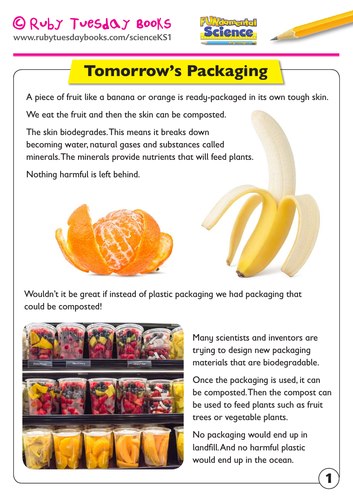

Get children to consider the impact of plastics on the environment. This resource includes an information sheet about future packaging possibilities and an investigation into how materials biodegrade by making a compost bin. It would be useful in KS1 science lessons on materials and even as a lesson structure for an Eco Club. This download complements our book ‘Let’s Investigate Plastic Pollution’ from our FUNdamental Science series. For more information, downloads and to purchase our books, please visit: www.rubytuesdaybooks.com
Since the airing of Blue Planet 2, awareness of plastics and the importance of our impact on the planet has been on everyones lips - keep the discussion going with these free resources.
This download helps meet the following National Curriculum targets:
KS1 Working Scientifically
Statutory requirements
Observing closely, using simple equipment.
Performing simple tests.
Identifying and classifying.
Using their observations and ideas to suggest answers to questions.
Gathering and recording data to help in answering questions.
Notes and guidance (non statutory)
Pupils in years 1 and 2 should explore the world around them and raise their own questions. They should experience different types of scientific enquiries, including practical activities, and begin to recognise ways in which they might answer scientific questions.
They should use simple measurements and equipment (for example, hand lenses, egg timers) to gather data, carry out simple tests, record simple data, and talk about what they have found out and how they found it out. With help, they should record and communicate their findings in a range of ways and begin to use simple scientific language.
Science - Year 1
Materials
Statutory requirements
Identify and name a variety of everyday materials, including wood, plastic, glass, metal, water, and rock.
Science - Year 2
Uses of everyday materials
Statutory requirements
Identify and compare the suitability of a variety of everyday materials, including wood, metal, plastic, glass, brick, rock, paper and cardboard for particular uses.
Find out how the shapes of solid objects made from some materials can be changed by squashing, bending, twisting and stretching (could include biodegrading)
Extracurricular
Children to learn about their wider responsibilities in their communities.
Something went wrong, please try again later.
Thanks! Will definitely use this beautiful resource.
Report this resourceto let us know if it violates our terms and conditions.
Our customer service team will review your report and will be in touch.